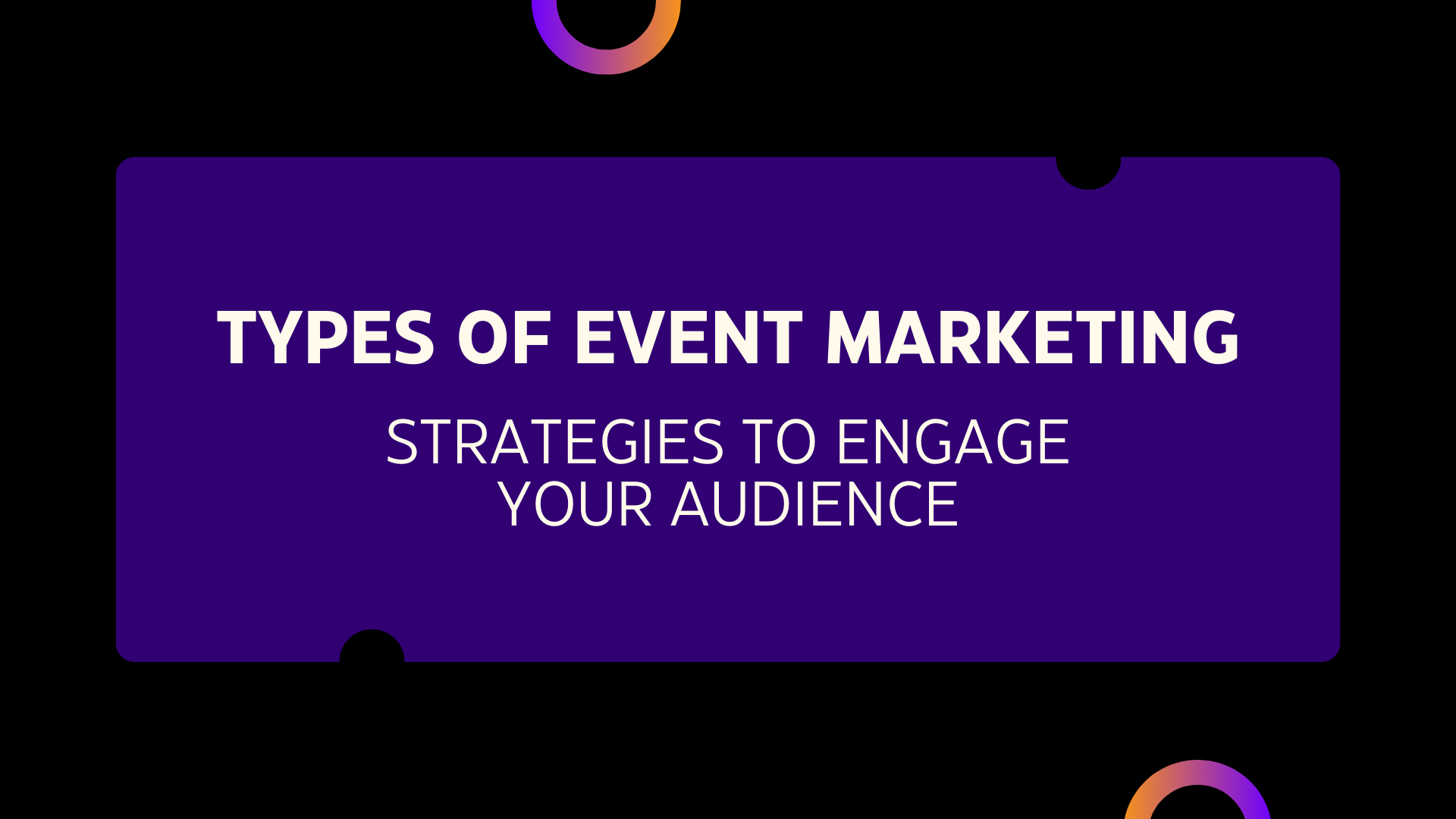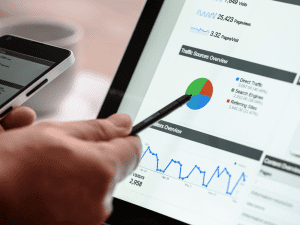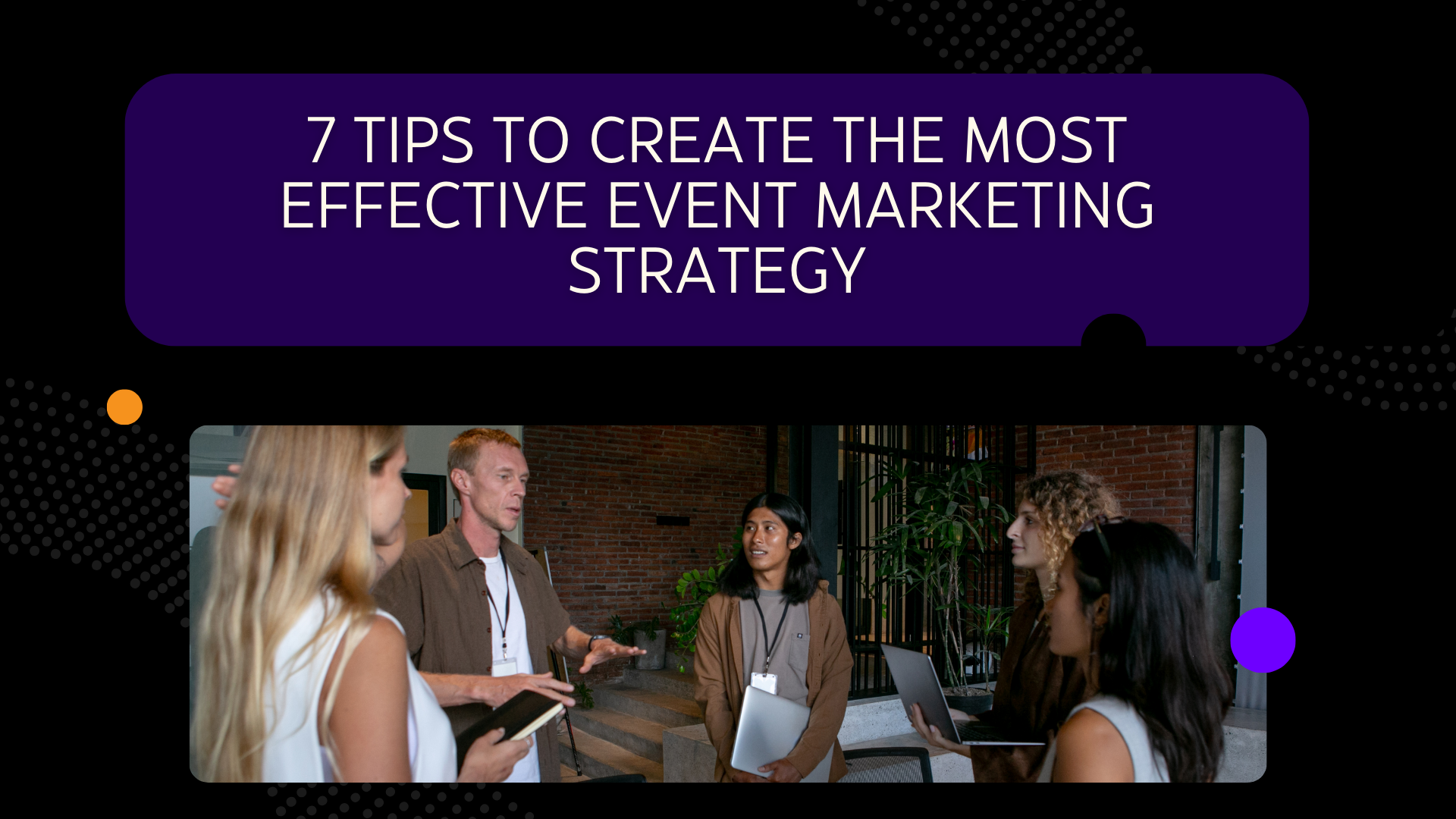Types of Event Marketing: Exploring Effective Strategies to Engage Your Audience
Event marketing has always been an effective marketing strategy. It’s about forging unforgettable experiences that really connect with your audience, not only about presenting products or services. A well-planned trade show, webinar, or pop-up event can increase brand exposure, engagement, and customer relationships.
This article explores the relevance of event marketing and a variety of strategies that will enable you to involve your audience and reach your company objectives properly. It covers the dynamic types of event marketing.
What is Event Marketing?
In event marketing, events are planned, organized, and executed to promote a brand, product, or service. The primary focus is on designing distinctive, engaging activities that connect with the target audience, building brand loyalty, and leaving a long-lasting effect. Trade shows, conferences, webinars, and live-streamed events are all events.
Key Parts of Event Marketing:
-
Purpose and Objectives: Every great event starts with well-stated goals and a clear agenda. Aligning events with business goals improves their relevance and efficacy, whether to generate leads, launch a new product, or raise brand awareness.
- Target Audience: Designing an event that appeals to the audience depends on knowing exactly that. Target audience demographics, tastes, and habits help adjust content, format, and messaging to their expectations.
- Event Design and Strategy: The event’s design and approach capture the ideals and brand character. This includes picking the correct subject, venue (physical or virtual), and compelling activities like live demos, panel discussions, and networking.
- Promotion and Marketing: An effective marketing strategy guarantees appropriate awareness of the event among the relevant persons. Social media marketing, email marketing, and sponsored ads can boost attendance and reach, as can fliers and press releases.
- Engagement and Interaction: It is absolutely essential to interact with participants of the event. Q&As, live polling, and gamification may keep audiences interested and make the event memorable.
- Measurement and Follow-Up: Understanding the event’s success depends on post-event study. Attendance, engagement, and lead creation should be assessed. Following attendees via emails or surveys also helps to preserve relationships and get input for future events.
Event marketing types may help you reach company goals and make a lasting impression if you execute these crucial elements.
The Power of Event Marketing
Modern marketing still heavily relies on event marketing since it lets companies interact directly with their audience in a real and interesting manner. Event marketing allows real-time engagement and direct interaction, which builds trust and community more than digital ads or email campaigns.
 Key Benefits of Event Marketing:
Key Benefits of Event Marketing:
-
Authentic Connections: Engage your audience personally or through virtual events to foster trust.
- Immediate Feedback: Assess attendees’ needs and opinions immediately.
- Community Building: Events unite like-minded people to create a feeling of belonging around your business.
- Brand Awareness: Events allow your brand’s personality and values to shine, making them memorable.
-
Networking Opportunities: Real-time interaction with possible clients, associates, or partners.
Types of Event Marketing Strategies
Each type of event marketing has benefits specific to its goals, audiences, and industry. The right event can increase brand exposure, lead generation, and consumer engagement. Let’s analyze the important strategies and how they can assist you succeed.
In-Person Events
Trade Shows and Expos
Brands can showcase their products and services to industry professionals at these huge events, frequently in a competitive and dynamic environment. They are perfect for exhibiting innovation, whether it’s a new product, cutting-edge technology, or novel solutions to real-world challenges. These events also provide a great opportunity to network with peers, possible clients, and collaborators. Direct access to decision-makers boosts visibility and can lead to strategic alliances, new business prospects, and industry growth.
Conferences and Seminars
Tech, healthcare, and finance industries depend on conferences for thought leadership and knowledge sharing. These events foster creativity by bringing together experts to discuss industry trends, issues, and solutions. Conferences provide keynote lectures, workshops, and panel discussions from industry leaders. These types of event marketing also offer unparalleled networking possibilities, allowing professionals to interact, collaborate, and establish partnerships that may improve future success.
Workshops and Training Sessions
Brands may engage audiences with practical and memorable workshops. Workshops let existing customers interact with your brand in a more personal context than traditional marketing. This makes them perfect for teaching valuable skills, demonstrating their benefits, or meaningfully presenting new products. These experiences educate, connect, and build trust. Participants feel empowered, informed, and more connected to your brand, increasing loyalty and advocacy.
Virtual Events
Webinars
To share your expertise, boost brand awareness, and generate high-quality leads, virtual event platforms are cost-effective and impactful. Event management must keep attendees interested throughout the session to optimize their influence. Live chats, polls, and Q&A sessions can make your webinar more engaging. These features keep viewers engaged, provide real-time feedback, and build meaningful relationships.
Virtual Conferences
Virtual conferences are vital for professionals to make connections, learn, and collaborate as distant work grows. Breakout rooms, one-on-one video sessions, and live chat enable real involvement at these massive online social events. Homebound attendees can attend keynote speeches, interactive seminars, and panel discussions. Networking events are enhanced via virtual conferences, which eliminate geographical constraints and trip costs.
Live Streaming
Live streaming on social media has made audience participation and interaction possible. Live streaming lets companies and creators instantly interact with their audiences, generating trust and authenticity. Among all types of event marketing, it’s a great opportunity to demonstrate behind-the-scenes, feature your employees, debut products, do Q&As, and build brand awareness worldwide.
Hybrid Events

What Are Hybrid Events?
Hybrid events let attendees choose how to engage, combining in-person and virtual elements. For instance, you may have a physical conference where attendees can network and interact while live-streaming sessions to a global audience. This format increases your event’s reach and makes it more accessible to those who can’t attend, making it more inclusive.
Why Hybrid Events Are Gaining Popularity
Hybrid events enable worldwide involvement and meaningful, intimate interactions. They’re also more adaptable to travel restrictions and unforeseen interruptions, making them essential in a post-pandemic environment where adaptability is important.
Experiential Marketing
Pop-Up Events and Activations
Pop-up event marketing types bring your brand to life in unexpected and unique ways. They can generate attention, excitement, and deeper audience connections by giving something unique. Based on your goals and target market, these events might be small, exclusive gatherings or costly, large-scale installations. Such activations engage participants and increase brand visibility beyond the event.
Guerrilla Marketing Events
Guerrilla marketing promotes a brand or message through surprising and low-cost methods. To create an emotional connection with the audience, surprise them. Think flash mobs that perform choreographed dances in public settings or street art projects that turn everyday locations into brand statements. This creative strategy draws attention and generates discussion, frequently leading to word-of-mouth and social media sharing.
How to Choose the Right Event Marketing Strategy
Your campaign’s success depends on choosing the correct event marketing strategy. Understanding your brand, audience, goals, and resources is crucial. Here are some essential factors to help you decide:
- Understand Your Audience: The proper strategy depends on your audience. To adapt your approach, research their preferences, interests, and behaviors.
- Define Clear Objectives: Set goals before organizing your event marketing approach. Are you seeking brand visibility, leads, sales, or customer loyalty? Experiential marketing, sponsorships, and product launches may work for diverse goals.
- Align with Your Brand Identity: Strategy should reflect brand personality and messaging. Luxury brands may host private events, while tech startups may host workshops or hackathons.
- Consider Your Budget: Your budget matters. Live events featuring celebrities are expensive yet effective, although guerrilla marketing or tiny in-store events may be cheaper. Use resources carefully to optimize ROI.
- Leverage Available Channels: Consider the top event promotion and hosting platforms. Streaming live increases reach and engagement, while physical events deepen relationships.
- Analyze Competitor Strategies: Studying how competitors market their events might be insightful. Find what works for them and add your own spin to stand apart.
- Assess Logistical Feasibility: Consider strategy logistics including location, scheduling, manpower, and technology. Choose a method that fits your operations.
- Measure Success Metrics: Choosing a strategy involves determining event marketing success. Attendance, social media mentions, event website traffic, and conversion rates should demonstrate success.
By carefully considering these factors and types of event marketing, you can create a strategy that engages your audience, meets your goals, and creates a lasting impression.
 7 Tips to Create the Most Effective Event Marketing Strategy
7 Tips to Create the Most Effective Event Marketing Strategy
-
Leverage Social Media: Promote your event on Instagram, Twitter, LinkedIn, and Facebook. To boost exposure and enthusiasm, create movies, infographics, and countdowns.
- Collaborate With Influencers: Collaboration with industry thought leaders may extend your reach. Their support may strengthen your reputation and draw consumers to your event.
- Offer Early Bird Discounts: Discount first-wave registrations to encourage early sign-ups. Urgency and momentum increase registrations.
- Utilize Email Marketing: Create customized email campaigns to share event details, updates, and follow-ups. Tailor messaging to certain groups using audience segmentation.
- Create a Dedicated Event Page: Create an engaging event landing page with a date, time, location, agenda, and registration CTA.
- Engage in Post-Event Marketing: Share results, testimonials, and highlights after the event. This extends event lifecycles and generates anticipation for future occurrences.
- Track and Measure Performance: Track attendance, engagement, and social media mentions. Assess success and find areas for strategy improvement using this data.
Implement these techniques to maximize your event’s impact and boost event success.
Measuring Success in Event Marketing
Event marketing success requires outcomes. Prioritize these KPIs:
- Record event registration, attendance, and social media engagement.
- Assess lead quantity and quality.
- Get attendee input to determine what worked and didn’t.
- Compare event revenue against costs. Consider direct and indirect effects like brand recognition and customer retention.
Measuring these KPIs always helps you improve your marketing efforts. If handled properly, events can increase brand exposure, lead generation, and customer loyalty. Understanding your audience and creating goals is crucial to success in in-person, virtual, or hybrid events.
Conclusion
For companies trying to engage their audience and produce unforgettable experiences effectively, all types of event marketing are still transforming tactics. By trying out different types of events — from in-person gatherings that encourage direct engagement and networking to virtual or hybrid events that break geographical barriers, and experiential activations that immerse attendees in your brand’s story — you can tailor event marketing efforts to your goals. Every style presents special chances for interaction, motivation, and developing close relationships with your target market.
Now, it’s your turn. Which event marketing strategy will you try next? Experiment, innovate, and watch your brand engagement soar!


